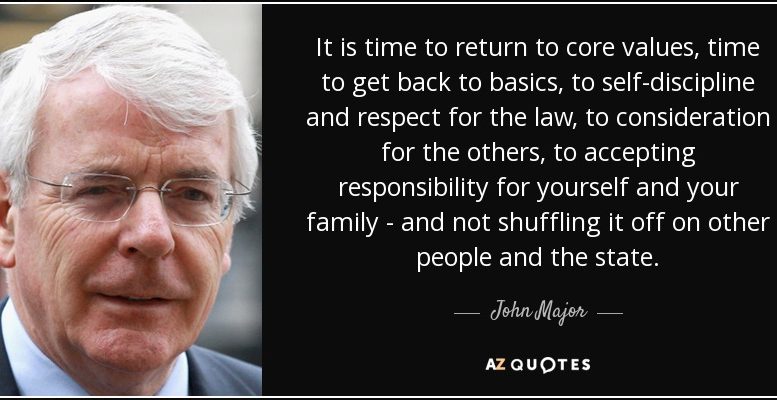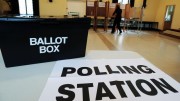Those of us who remember British politics in the 1990’s also remember the ‘Back to Basics’ campaign started off by the then Prime Minister John Major with a speech about reclaiming old values that he made at the 1993 Conservative Party Conference. We also remember how ignominiously that this campaign ended.
Whilst Back To Basics was not specifically a personal morality campaign, much of the press took it as being one. On this occasion the press was correct to take Major’s claim to be promoting traditional values in the way that they did as the press used Major’s Back to Basics campaign as a springboard for journalistic investigations into all manner of hypocrisy and bad behaviour by Conservative Party MP’s and other functionaries.
What the Press found was that underneath the carapace of the Back to Basics rhetoric was a cesspit of sleaze, infidelity and moral turpitude that, along with the Europe issue, went a long way to discrediting the Tory government. According to Wikipedia the list of scandals that occurred after Major’s Back to Basics speech is pretty long. Here’s a selection:
1994
- On 8 January 1994, millionaire MP Alan Duncan resigned as Parliamentary Private Secretary after it was revealed that he had acquired a house in Westminster (which had been designated as a council house) adjoining his own 18th century townhouse, at a reduced price, by exploiting a government programme to increase home ownership for the underprivileged. The house had been occupied for decades by an elderly next-door neighbour, and Duncan gave him the money to purchase the house at a huge discount under the “Right to Buy” scheme, on condition that Duncan would take over the house on the neighbour’s death.[1][17][35][36]
- On 9 January 1994, The Earl of Caithness resigned from his post as Minister for Aviation and Shipping one day after his wife committed suicide. According to his wife’s father, the tragedy had been precipitated by the Earl’s involvement in an extra-marital affair.[1][17][36][37]
- On 10 January 1994, married Conservative MP David Ashby admitted that he had shared a hotel bed with a “close” male friend on a rugby tour, but denied claims by his wife that he had left her for a man, or that he was having a homosexual relationship.[7][17][38][36][39]
- On 16 January 1994, Conservative MP Gary Waller confirmed newspaper reports that he had fathered a child with the secretary of another MP.[40][41][42][26]
- On 8 May 1994, Michael Brown resigned as a junior government whip after the News of the World revealed that he had taken a holiday in Barbados in the company of a 20-year-old man. At that time, the age of consent for same-sex male relationships was still 21 (it was due to be reduced to 18 later in 1994).[1] Brown subsequently acknowledged his sexuality, becoming the second openly gay MP.[7][52] In his diaries, Conservative MP Gyles Brandreth wrote of this revelation:
You’ve got to pity the poor PM [Prime Minister] too. As [Brandreth’s wife] Michèle says, ‘That’s Back To Basics gone to buggery‘.[53]
1995
- On 6 March 1995, Robert Hughes resigned as Minister responsible for the Citizen’s Charter over an affair with a constituency worker who had come to him for help from an abusive relationship. Hughes confessed the affair and resigned when he believed that the liaison was about to be exposed in a Sunday newspaper.[7][67]
- On 9 April 1995, Richard Spring resigned as a Parliamentary Private Secretary after a News of the World sting allegedly caught him in a “three in a bed sex romp” with a male acquaintance and the acquaintance’s girlfriend.[7][56][68][69] The fact that Spring was single at the time raised accusations that the paper was conducting an unwarranted intrusion into his private life.[51]
- On 10 April 1995, Jonathan Aitken resigned as Chief Secretary to the Treasury, in order to sue The Guardian and the ITV investigative journalism series World in Action, after they alleged that Saudi businessmen had paid for his stay at the Paris Ritz hotel, that he had enjoyed inappropriate commercial relations with two British-Lebanese arms dealers while minister for defence procurement, and that he had also procured prostitutes for a Saudi prince and his entourage while they stayed at a British health farm.[70][71] Aitken denied all accusations and promised to wield “the simple sword of truth and the trusty shield of British fair play” in libel proceedings which he brought against The Guardian and the producers of World in Action (Granada Television). At an early stage in the trial, it became apparent that he had lied under oath, and he was subsequently convicted of perjury (after the Major government had fallen from power) and sentenced to a term of imprisonment.[72][73][74]
1996
- In 1996 a long-running investigation into the ‘Homes for votes scandal‘ found that the Conservative-controlled Westminster City Council had conducted an unofficial policy of removing homeless people from the borough and replacing them with likely Conservative voters.[75][76][77]
- On 2 June 1996, Rod Richards resigned as a Welsh Office minister after his extra-marital affair was disclosed in the News of the World.[78] Richards had been a staunch advocate of the “Back To Basics” campaign in his strongly religious Welsh constituency.[56] Upon hearing of the revelations, John Major demanded that Richards resign immediately; this so-called “one bonk and you’re out” policy was a notable contrast with his earlier leniency towards Norris, Yeo and David Mellor.[7][79]
This is not the full list of sex, money and influence related scandals that plagued the Tories throughout the mid to late 1990’s. The full list is found via the Wiki link but I suspect that there were even more local scandals involving the Tories that went on back then which didn’t make the national press.
I have the odd feeling that the spectre of Back to Basics might come back and haunt the Tories over the next few months. This is because there is nothing that the press likes to get their teeth into than a good old hypocrisy story and when it comes to Boris Johnson’s new ‘war on drugs’ policy there is likely to be an awful lot of hypocrisy to be uncovered.
Johnson’s ‘war on drugs’ policy is not more than 24 hours old and already there are two stories on the Guido Fawkes site that point to this new policy becoming an updated simulacrum of Major’s Back to Basics campaign.
The first story is about the statement by Kit Malthouse the Crime and Policing minster at the Home Office. He has said that with thousands of people working on the Parliamentary Estate it is likely that some of them are drug users and either using drugs on or off the premises. I very much doubt that these drug users are all in relatively junior positions and some may be senior workers or those working in particularly sensitive areas.
Mr Malthouse’s statement is a open invitation for the Press to start digging into who is and who is not a drug user in Parliament and what area they are working in. If the Press uncover credible stories of those in sensitive areas or in middle to high positions doing drugs whilst a crackdown is going on then the Press is going to make great hay about the hypocrisy. When I was a freelance photojournalist I did several ‘celebrity drug user’ stories and the press were more than willing to spend thousands of pounds on outing celebrity drug users who had previously made anti-drug statements. I recall one quite well paid job where I was tasked with driving a Red Top newspaper journalist and his contact around London for a week looking, unsuccessfully on this occasion, for the drug dealer for a major 1980’s pop star who I can’t name for legal reasons as they are still alive who had made anti-drug statements but who did later turn out to have had a major heroin and coke habit.
If there are suspicions that Parliamentarians whether in the Commons or the Lords or those doing ancillary work on the Parliamentary estate are doing drugs then I have little doubt that our glorious gutter Press, will scent an opportunity for a story and get stuck in. After all it is stories like this that they are damned good at reporting on.
The second relevant story is also from Guido Fawkes and concerns the previous drug habits of those who are now quite senior in Her Majesty’s Government.
Guido pointed out that the policy of targeting middle class drug users is mired in hypocrisy as a lot of the contenders for the 2019 Tory leadership contest had drug records of their own. Guido listed the names and their drugs of choice. Guido said:
Boris, cocaine: “I tried it at university and I remember it vividly. And it achieved no pharmacological, psychotropical or any other effect on me whatsoever.”
Gove, cocaine: “I took drugs on several occasions at social events more than 20 years ago… at the time I was a young journalist. It was a mistake. I look back and I think, I wish I hadn’t done that.”
Hunt, cannabis: “I think I had a cannabis lassi when I went backpacking through India”
McVey, cannabis: “tried some pot” when she was “much younger”.
Raab, cannabis: “At university, I tried cannabis, not very often as I was into sport”
Hancock, cannabis: “tried cannabis a few times as a student but has not taken any illicit drugs since”.
Leadsom, cannabis: “I smoked weed at university and have never smoked it again since.”
There is a nasty stink around Westminster at the moment and the smell isn’t of weed, but hypocrisy. Here we have the spectacle of senior Members of Parliament who have indulged in the very things that they now say that they are opposed to and want to crack down on. I fear that this isn’t going to end at all well for Boris and chums. If a Parliamentary drug scandal emerges then it will give massive amounts of ammunition to Labour to call out the hypocrisy of the Tories.
Personally I’m getting a bit of a whiff from these two stories and that is the whiff of the sort of scandals that upended Major’s government. I’d wager that it will not be too long before someone comes out and says to the press that they saw MP Mr or Ms X snorting coke in a Parliamentary toilet or something similar. The Press will give such people an incentive to do so. All it would take is one disgruntled employee or ex-employee of Parliament to speak up and in particular speak to the press and a massive hypocrisy scandal could break out that would taint Johnson’s Tories just as badly as Back to Basics tainted Major’s government.






The object of the exercise isn’t to do anything about the sleaze or illegal habits of the ruling class, the object of the exercise is to give the plebs the illusion that you are cleaning things up while actually doing nothing. Optics is the name of the game, nothing more nothing less. Arrogant and sleazy as ever the ruling class rides roughshod over the peasentry, situation normal.
Judging by the timing I would not be surprised if this announcement was made with the idea of shoring up support for rural and semi rural conservatives in places like Shropshire North.
From what I have been told by my wife, who once taught a few children who went on to become politicians, drug use by members of the House of Lords (she mentioned a Dame) might also have been part of their upbringing. At her school the Head didn’t do anything about it because their parents were wealthy middle class who took drugs themselves, their attitude was ‘we do it at home so why shouldn’t our children?’.
Depends on what drugs we are talking about here are we talking weed or class A’s? I certainly agree that if there’s no parental support or a no drugs policy in some private schools then it’s not going to be a priority. As a aside someone, I can’t remember who though, remarked recently that for the vast majority of time when Britain had decent politicians from the late 19th century to the late forties drugs were pretty readily available to politicians and others in the know who could get them. It’s quite possible that many of our great politicians of the past were working whilst shitfaced and they seem to have performed OK. Churchill for example drank to such an extent that he would be considered an alcoholic today yet he managed to run the country fine. Personally I’d rather have a shitfaced politician who was on my side than a straight edge one who wasn’t.